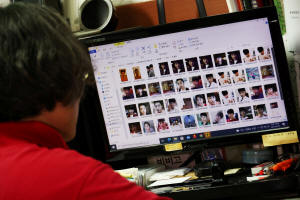South Korean lawmakers to vote on cameras in operating rooms after
surgery deaths
 Send a link to a friend
Send a link to a friend
 [August 30, 2021]
SEOUL (Reuters) - South Korean
lawmakers will vote as early as Monday on whether to require hospitals
to place surveillance cameras in operating rooms after a series of
medical accidents involving unqualified staff who stood in for surgeons. [August 30, 2021]
SEOUL (Reuters) - South Korean
lawmakers will vote as early as Monday on whether to require hospitals
to place surveillance cameras in operating rooms after a series of
medical accidents involving unqualified staff who stood in for surgeons.
If the bill is approved by parliament, South Korea will be the first
developed country to require closed-circuit cameras to record surgical
procedures.
The push for having cameras in operating theatres intensified after a
case in 2016 in which surgeons at private clinics were accused of
assigning nurses or underqualified doctors to perform procedures,
sometimes with fatal results.
Kwon Dae-hee, then a university junior, died of haemorrhage in October
2016 after 49 days in coma as a result of a jawline surgery in Seoul,
which he did not tell his family about ahead of time, his mother Lee Na-geum,
61, told Reuters.
Lee, who has been holding a one-person protest in front of the
parliament since January 11, 2018, said her son was traumatised by
bullying in high school for his prominent chin, and he was determined to
undergo the 6.5 million won ($5,583) cosmetic surgery.
Lee said she felt lucky to have obtained the CCTV footage of her son's
surgery as there were hundreds of parents who would never know if their
children's death on the operating table was the result of malpractice.

She also said she had reviewed the seven-and-a-half hour long footage of
Kwon's surgery over a thousand times and was able to prove that it was
performed in part by an unqualified nursing assistant and an intern
doctor, not by the chief plastic surgeon as promised as he was dealing
with two other surgeries at the same time.
This led to Kwon losing over 3.5 litres of blood and he died of
excessive bleeding.
With the video evidence she collected, Lee sued the hospital and the
head surgeon, who was later found guilty of involuntary manslaughter and
sentenced to three years in prison.
"It is a medical crime when someone else - 'a ghost' - performs the
surgery and not the surgeon hired without patient's consent," Lee said.
"There are so many unfortunate bereaved families who cannot reveal the
truth because they don't have physical evidence when a healthy person
dies in an operating room."
[to top of second column]
|

Lee Na-geum, whose son Kwon Dae-hee died after undergoing
jawline plastic surgery on September 8, 2016, looks at her
son's photos during an interview with Reuters at her home in
Seoul, South Korea, August 30, 2021. REUTERS/Kim Hong-Ji

Multiple attempts had been made to amend the Medical
Services Act to require surveillance cameras, primarily to catch
stop doctors from delegating surgeries to unlicensed personnel, an
act which is subject to a maximum of five years in prison or 50
million won ($42,952) fine.
Up to now, such attempts had died due to lobbying by doctors, said
Lee who began an advocacy group for medical justice and patients'
rights.
The bill was met with objections from doctors, hospitals and medical
groups, including the 140,000-member Korean Medical Association (KMA),
which claims video-monitoring will undermine trust in doctors,
violate patient privacy and discourage doctors from taking risks to
save lives.
"We think trust is key in doctor-patient relationship... the bill
undermines doctors to actively recommend treatment methods and
treating patients," KMA spokeswoman Park Soo-hyun told Reuters.
"Residents have already expressed their intent not to apply to
surgery or surgical departments if the CCTVs are installed in
operating rooms, which will lead to a collapse of an essential part
of South Korea's medical care."
The bill appears to have overwhelming public support: In a poll by
the Anti‑Corruption and Civil Rights Commission, an independent
government agency, in June, the bill had the support of 97.9% of the
13,959 respondents.
($1 = 1,164.0800 won)
(Reporting by Sangmi Cha; Editing by Raissa Kasolowsky)
[© 2021 Thomson Reuters. All rights
reserved.] Copyright 2021 Reuters. All rights reserved. This material may not be published,
broadcast, rewritten or redistributed.
Thompson Reuters is solely responsible for this content.
 |